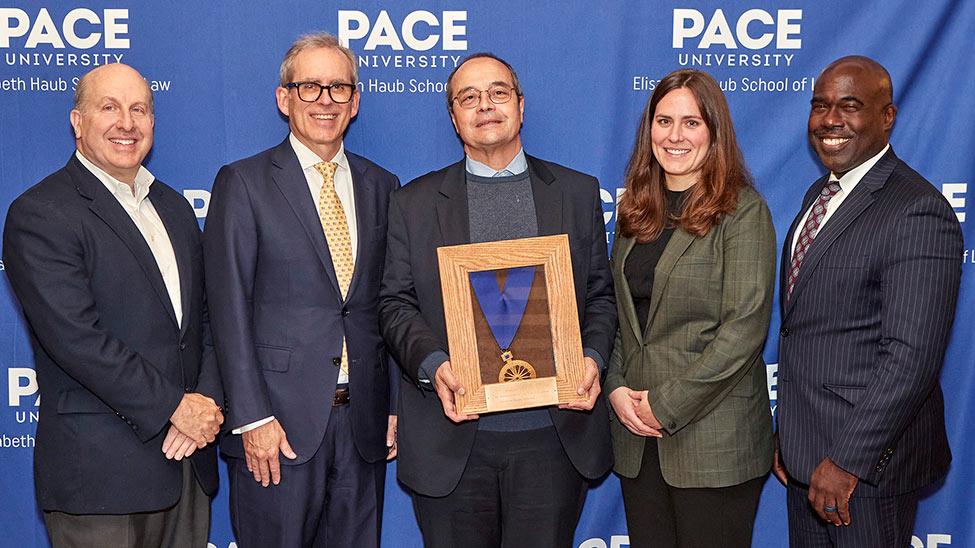
Prestigious 2022 Elisabeth Haub Award for Environmental Law and Diplomacy Presented to Brazilian Environmentalist Paulo de Bessa Antunes

The Elisabeth Haub School of Law at Pace University has conferred the 2022 Elisabeth Haub Award for Environmental Law and Diplomacy on Professor Paulo de Bessa Antunes, an environmental scholar and leading professor of environmental law at Universidade Federal do Estado do Rio de Janeiro, and head of the Environmental Practice of Campos Mello Advogados (Brazil).
The award was presented on Tuesday, November 8 during an in-person ceremony at the law school and broadcast to supporters from across the globe representing more than 10 countries.
This year’s award highlighted the Amazonian crisis and the rule of law in Brazil and included a timely discussion with the laureate, led by Professor David Cassuto, Director of the Brazil-American Institute for Law and Environment (BAILE) at the Elisabeth Haub School of Law at Pace University.
“We are honored to present the 2022 Elisabeth Haub Award for Environmental Law and Diplomacy to Professor Bessa, who has been valiantly fighting to support the development and implementation of laws protecting the environment in Brazil, including protecting the Amazon against deforestation,” said Horace E. Anderson Jr., Dean of the Elisabeth Haub School of Law.
Professor Bessa is considered one of the founders of Brazilian environmental law. He began his career as a member of the Federal Prosecutor's Office and was the first coordinator of the defense of the environment in the State of Rio de Janeiro. During his three decades in the Federal Public Prosecution Service, he used fledgling environmental laws and theories to file and win several seminal lawsuits to protect the environment. These lawsuits resulted in the establishment of the Reserva Beach protected area in Rio de Janeiro; the destruction of highly toxic PCBs so that they were not released into the environment; and the abandonment of plans to construct a bridge in indigenous territory over the objection of the indigenous Xerente. Professor Bessa is also a highly respected legal practitioner and a leading scholar of Brazilian environmental law, having authored more than 280 publications in the fields of environmental law, justice, and human rights.
During the program, Professor Bessa spoke about the most urgent environmental threats to the Amazon and explained its significant impact on global climate change, pointing out that 7 of 10 greenhouse gas emissions come from the Amazon. “It is becoming clear to scientists that maybe the Amazon is emitting more greenhouse gases than it is capturing from the environment,” he said. He acknowledged several factors contributing to this crisis, including fires and deforestation which account for about 50 percent of greenhouse gas emissions. Professor Bessa spoke to how Brazil has played an important role in advocating for mechanisms for climate change with international treaties and is quickly changing to renewable energy. “I believe that we will play a bigger role in the next administration,” he added.
He also spoke about the ways that Brazil has recently strengthened its conservation efforts by establishing more protected areas, increasing the number of regulations protecting indigenous people, and creating a set of environmental regulations and legislation. Yet, he pointed out, that Brazil’s greatest challenge is a lack of funding and infrastructure to enforce these laws. He said that biotechnology, understanding of the forest and special knowledge of the indigenous community will be essential to the future. “This will be the main question that the new administration should address within the international community,” commented Professor Bessa.
The Elisabeth Haub Award for Environmental Law and Diplomacy is the world’s most distinguished award in the field of environmental law. The award was created in 1997 by the Elisabeth Haub School of Law at Pace University, in cooperation with the Haub Family, to honor the legacy of Elisabeth Haub (1899–1977), a noted philanthropist and advocate for strong laws for the conservation of nature. The award is chosen annually by an esteemed jury of leaders in environmental law and was first established to commemorate the 25th anniversary of the United Nations Stockholm Conference and the 5th anniversary of the United Nations Rio de Janeiro Earth Summit.
“Through this award, for 25 years, we have recognized the diplomats, policy makers, lawyers and activists who have sought to protect our environment through the rule of law, the cooperation of world governments and the group efforts of advocates across the globe,” said Christian Haub, businessman, philanthropist and grandson of Elisabeth Haub, who presented the award along with his daughter Anna-Sophia Haub, who also serves on the board of advisors for the Law School’s Sustainable Business Law Hub. “It is our hope that with this award, we are making a statement in support of those individuals and communities who are fighting to create a more sustainable planet.”
Learn more about the 2022 laureate and watch the video of the program below.